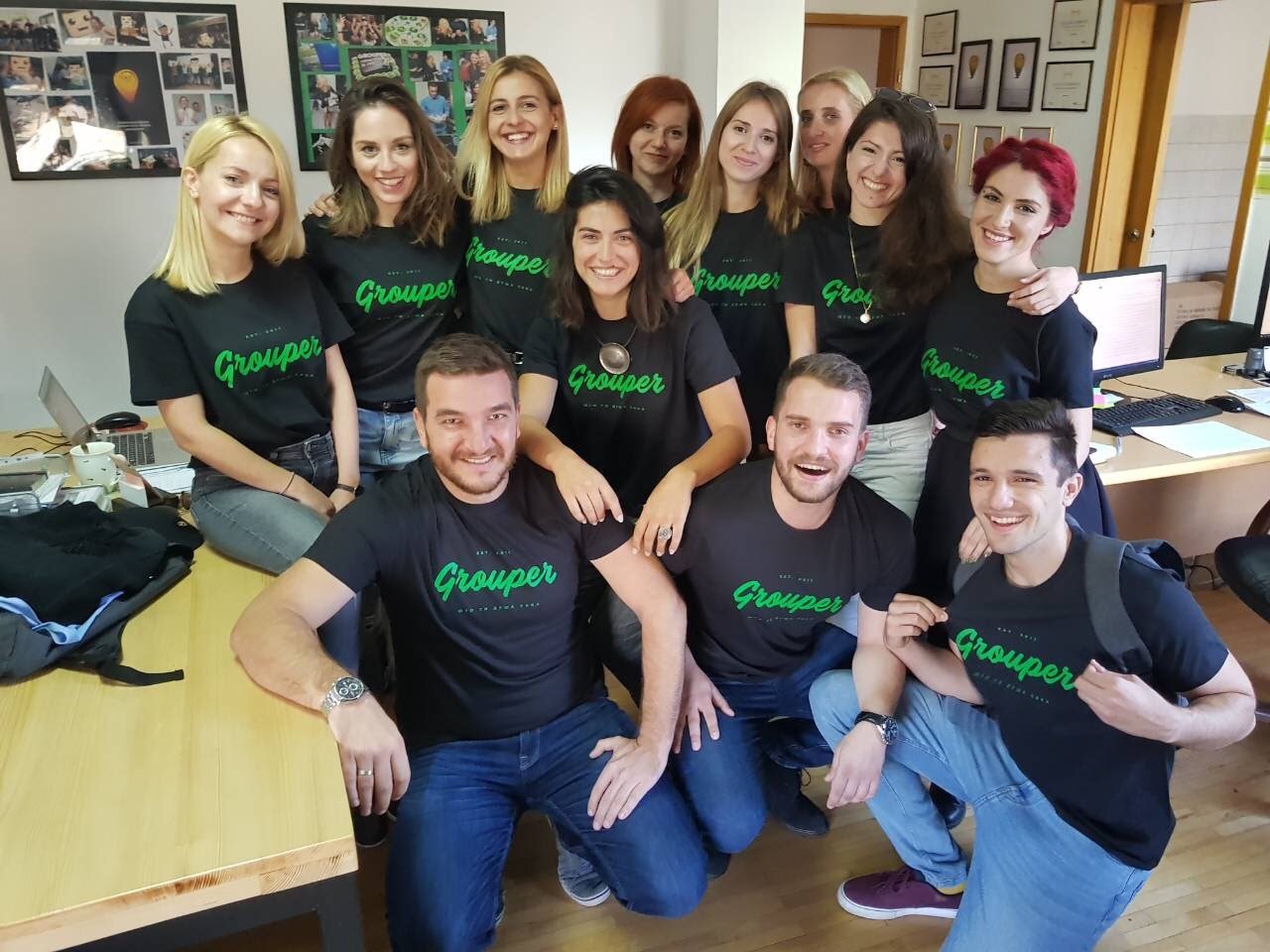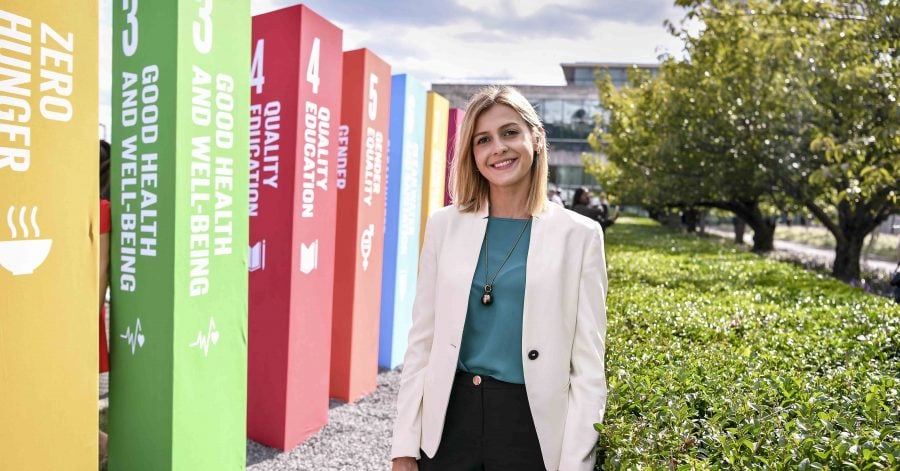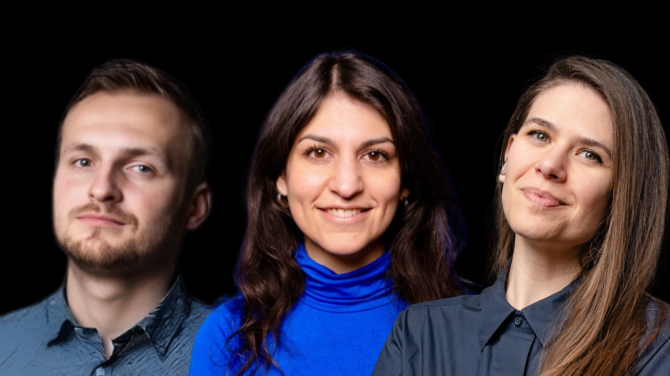Who are the women entrepreneurs that inspire and drive the local SEE ecosystem? The Recursive introduces you to Nina Angelovska, сo-founder and former CEO of North Macedonian e-commerce startup Grouper, the first deal platform of the country. Grouper works with more than 3000 merchants and has 270,000 users. This week she made a successful exit, as Grouper was acquired by Polish payment company Payten. Payten is part of the Asseco SEE Group, one of the biggest banking and payment operators in SEE.
Angelovska has a rich background in both the public and private sectors. Apart from co-establishing Grouper in 2011, she also co-founded the first North Macedonian e-commerce Association in 2017. She served as a president there until stepping in as a Minister of Finance of North Macedonia in 2019, a position she held for a year. In 2019, she was named one of the seven global UNCTAD eTrade for Women Advocates, where she is promoting the participation of women in the policymaking process of e-commerce reforms.
The Recursive reached out to her to chat about her entrepreneurial experience, her insights on the North Macedonian startup ecosystem, and what is like for an entrepreneur to serve as a public officer.
The Recursive: Can you tell us more about your experience as CEO and co-founder of Grouper? How did the company develop?
Nina Angelovska: When we embarked on the entrepreneurial journey 10 years ago, I was 22 years old. Just after graduating as student of the year, I won a national business plan competition and got a small grant to start the business. This was maybe the main incentive to dive right away into launching a business. I co-founded Grouper with two partners (Martin Kitanovski and Aleksandar Simonovski,- Ed. Note) – we had a lot of passion and enthusiasm and we wanted to transform the e-commerce market which was non-existent at the time, basically.
People were not using payment cards. Internet penetration was low. The lack of habits for online buying contributed to the fact that businesses were not even selling online. We had to create the market in order to grow Grouper.
It was a bumpy road, we had to deal with lots of struggles and challenges that come on the way especially in a developing country when you’re entering an industry that was not at all developed. Eventually, we were recognized as the game-changer of e-commerce and got lots of international recognition, as well for the work that we did in educating the market and for having a great impact on the e-commerce market in North Macedonia.
We were growing the company, year by year, introducing new things all the time, adapting to the new circumstances and trends. It was a very, very thrilling journey (one “hell of a ride”) and I’m excited to see Grouper grow and develop as part of an international group with much greater potential, resources, and expertise.
Grouper has come a long way, but still has a long way to go and this upcoming journey will be much easier with a partner like Payten, a member of the ASEE Group. This acquisition for Grouper is much more than that, it represents a recognition of our hard work and dedication, of the great job we have done so far but also the best opportunity to accelerate further growth and untap its potential to the fullest.

© Grouper, the Grouper team
How has the e-commerce market in North Macedonia evolved over the past 10 years?
I’ve been practically “breathing” the e-commerce market for the past 10 years. In fact, the drive for change led me to co-founding the Macedonian E-commerce Association in 2017 that I am heading.
There has been a progress over the years, but I can not say we are satisfied with the speed of development and growth of the industry. To measure one’s progress we always have to compare, and if we compare North Macedonia with other European countries we stand good in the indicators for readiness for e-commerce but if we look at the actual numbers we are somewhere at the end in the charts. The lack of digital skills of our nation is one of the key barriers.
This is a big challenge that Grouper was facing as well. Our customer support team had to even assist people in opening email accounts, educate them on how to use their payment cards online, etc., in order to turn him/her into a customer.
However, the pandemic definitely accelerated e-commerce in Macedonia and the region. Online transactions towards domestic e-shops noted an increase of 135% on a yearly basis.
I believe that now is the time to even further accelerate the growth of the industry. Now, more and more companies are becoming aware of the potential of e-commerce and more people are turning to online shopping. The pandemic has pushed businesses and people to e-commerce.
The selling propositions of e-commerce during the pandemic were no longer “saving time and more convenience” but rather protecting our health or simply not having another choice during lockdowns and restrictive measures imposed by the Government. That was a very important factor in accelerating and pushing people to learn how to pay their bills online, how to shop groceries online etc.
How many Macedonians now shop online in percentage in comparison with when you started your company?
According to Eurostat data, the Internet penetration nowadays is above 80% and around 40% of the internet users have made at least one online purchase in the past 12 months. So 40% of the internet users shop online, a year ago it was 36%, and in 2017 it was 26%. When we launched Grouper, around 3% of the internet users were shopping online. I think that we did impact the development of the e-commerce ecosystem a lot, but there is still a lot to be done, especially if we compare that to other countries in Europe.
Grouper enabled thousands of customers to make their first online transaction and hundreds of merchants to start selling online, reach new clients, and grow their business.
Right after the start of the pandemic, Grouper launched its marketplace platform (Grouper Shopping Mall) and enabled many companies to open their e-shops as part of the platform, hence adapt quickly and compensate for the decline at their physical locations, while reaching new clients.
How has Grouper helped business owners transition to online retail?
There isn’t a magic wand for opening your own e-shop and seeing overnight sales and business growth. It takes a lot of hard work and dedication. Marketplace platforms such as Grouper make it much easier for business owners as they offer all the resources to the business. They don’t have to worry about payments, connecting with a bank, customer support, getting connected to the delivery company. Grouper’s team on-boards the company to the platform and guides them on how to upload their products, to manage their shop, and it helps them with various marketing tools to get potential clients and increase sales. In addition, businesses have access to the community of over 270k Grouper users.
During the pandemic joining e-commerce was one of the most powerful tools for adapting. The ones who were able to adapt quickly with e-commerce are the ones who managed to compensate better for the decline in sales in their physical stores, while some even managed to turn the challenge into an opportunity and even reach growth.
What would you advise founders who want to exit their companies?
My advice would be – do great work with passion and commitment and give the best you can in developing and growing the business, and when the opportunity presents, be ready to embrace it.
I cannot say that we had a goal or mission when we were developing and growing the business that one day we will do an exit. Somehow, over the years all recognitions and achievements to us came very organically. We loved what we did and we did it with lots of passion and energy. We were putting in lots of hard work, we were overcoming challenges while constantly learning and our work and impact were getting noticed and recognized. We were never chasing things. We were just always prepared to embrace the opportunities that showed. I guess we were lucky to have this opportunity, but as they say – luck is when readiness meets opportunity, so when this opportunity showed we were ready to embrace it and work hard to make it happen.
What is your intake from holding a public position? What progress did you make as a minister?
I have seen all sides of the ecosystem from the inside, from the private to the non-government to the government sector. The private sector is where the magic happens, where value is being created… and the public sector, in a great deal, is responsible for creating an enabling environment for the magic to happen and greater value to be created. It should make life easier for business people on one hand and through policies to stimulate and foster growth so the true potential can be unlocked.
I have been always pushing for change from the outside, and when I was invited by the PM Zoran Zaev to join the Government as a non-party member, the opportunity to be able to make a change from the inside was my key motive to accept the huge responsibility I was given. With lots of optimism, energy, and thirst for change, I committed to bring on the speed and mindset of the private sector to the administration.

© Nina Angelovska
I had a very ambitious agenda. Amongst the priorities of the Ministry of finance, I also committed to infusing technologies and digitalization across all sectors. I believe that digitalization is our only way to leapfrog, transform our administration, fight tax evasion and informality, speed up our economic growth, eliminate bureaucracy, fight corruption, and ‘give wings’ to the companies to drive the growth. It is also an enabler for transparency – one of the key priorities of the government. In the first few months, we launched three new digital tools that greatly increased the transparency – OpenFinance (opening the treasury to the public), Public Debt (opening and presenting data on borrowings, repayments, Eurobonds), and Capital Expenditures (data on execution by budget user monthly). We were also working on many law amendments, and key reforms such as drafting the new Organic Budget Law, Tax reform strategy, Action Plan for fighting the grey economy putting it high on the priorities list, etc.
And then COVID-19 happened. The pandemic called for bold and quick decisions to navigate the best in unpredictability. We designed many COVID measures to support the business sector…and when we designed these measures it was not only the “What” but the “Why” and “How”. For instance, with one of the measures that was aiming to stimulate domestic consumption by giving financial assistance to targeted groups of people, it was designed in a way not only that the people get the support, but to get it via payment cards, to be able to spend it over the affected sectors aiming to also achieve other more systematic goals like speeding up our way towards a cashless society, more payment cards usage. And instead of the old traditional way to ask for people to fill forms and apply at Government institutions, we used the data and transparently selected the groups that got their payment cards either at the banks or delivered at home. I induced changes in the way measures are designed and implemented, de-bureaucratized many processes, and I really hope this will “stick” and be practiced in the future as well.
I headed the public finances of our country during the biggest crisis of all times. It was a very difficult year but it made me stronger and taught me things that no schooling can.
What are your plans after the acquisition of Grouper?
I stepped down as CEO of Grouper when I accepted to join the Government as Minister of Finance in August 2019. Now that the process of acquisition that I headed as a co-founder is completed, after a decade of super hard work and “sacrifice” that being an entrepreneur brings (especially during the last year)… I plan to take a deep breath. Although I have certain work arrangements I will use this period to evaluate the options and reflect before I make any next big decision. I am slowing down a bit the super-fast pace and taking some time for myself, family and friends, while continuing the passion and efforts for e-commerce development as President of the Macedonian E-commerce Association and UNCTAD’s eTrade for Women Advocate.








